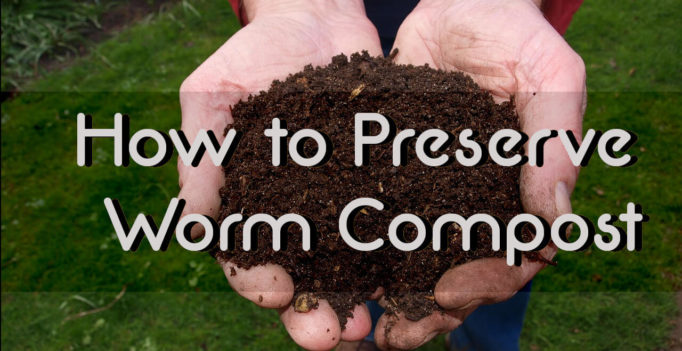So, you want to hang on to that black gold a while before putting it to use? No problem! As long as you follow a few basic guidelines, you’ll have a secure stash to pull from in no time.
Why hold on to dirt?
This is no ordinary dirt we’re talking about! Black gold is a nutrient-rich compost made naturally by Eisenia fetida, otherwise known as the red wiggler worm. Within this fine mixture of worm poop can be found all sorts of beneficial bacteria and earthy organic matter.
Worm compost is put to use in the garden, most often in soil, for its ability to enhance structure, improve aeration, feed plants, and capacity to retain and drain moisture. It’s also an excellent foliar treatment when used in the form of a worm compost tea. It has the amazing power to revive plants and replenish earth that has become infertile, depleted, and unable to sustain life.
With liberal use of fresh vermicompost, abundant vitamins, minerals, and microscopic life quickly repopulate and enrich barren areas. Soon, plants grow healthy again and balanced ecosystems become established with ease.
What’s the secret ingredient?
Here’s where the beauty of worm compost lies- there’s no secret about it at all! This most naturally potent, yet perfectly balanced fertilizer is made from nothing other than the very food and paper waste you would otherwise consider trash.
Instead of garbage going the way of landfills, compost worms devour it, use it to fuel their own population growth, and produce finely textured casts that work as long-lasting fertilizer.
“Finished” vermicompost is about 70-80% worm casts plus organic matter at all stages of decomposition.
Does it have a shelf life?
Once worm compost has been harvested, meaning separated from worms and cocoons, it is ready for use. You could use it with the worms and cocoons in it, but then you will be pulling from your worm workforce.
As this fertilizer holds its “power” in the life within it, it is essential that life be supported even while shelved. This means only that oxygen, moisture, and temperature remain fairly consistent from the start. With these things in place “fresh” worm compost remains viable for up to three years, or more!
Oxygen
Oxygen-loving bacteria slowly consume the organic matter within the mixture and continue to multiply and die off in a natural progression. Without oxygen, however, these strains of bacteria will all perish and be replaced by anaerobic bacteria – which, in part, defeats the purpose of having such valuable compost.
To maintain adequate oxygen you need only to store your mixture in a non-airtight container with the lid slightly ajar or some holes drilled into the top.
Moisture
Whereas red wigglers love their homes to be kept at a fairly moist 80% humidity, the compost itself need only be just barely damp to support the life within.
As worm farmers prepare to harvest their compost, a drying process allows much of the moisture to evaporate. Mostly, this is so that the clumps and clods can easily be sifted into a loose and easily spreadable material.
Of course, maintaining this moisture in an opened container takes only the slightest effort- a few spritzes from a water bottle every once in a while should do the trick. Just be careful to use dechlorinated water or else you’ll be killing off those good bacteria anyway!
Please note that once dry, life can not be brought back to worm compost by wetting it. The structural qualities become compromised. It no longer serves to condition soil nearly as well as the fresh product can.
Temperature
Without worms or cocoons to keep alive, the compost itself may have a wider range of safe temperatures. Still, too much cold or heat will also damage the bacteria. It’s best to store what you harvest well above freezing and well below…cooking? A wide range of “average” room temperatures is just perfect.
How to Know if your Worm Compost has “Gone Bad”
It’s always best to use your worm compost as “fresh” as possible when it is most well-aerated, moist, and full of life. But might it ever be too late? Can a bucket of dirt even go bad?
Well, there are two ways to look at it. If you most value the aerobic bacteria and their potential, then yes, they can die and become useless. If they die, anaerobic bacteria will take over and make a smelly situation out of your compost. So, this could be considered “bad.”
However, if you take into account that even stinky compost is super full of vitamins and minerals, you can see how it too can be good – in the right places. Mixed into depleted soil, “expired” worm compost will still improve structure, porosity, nutrient content, and create a better environment for plant life.
NOTE Reserve your very best quality worm compost for amending the soil of vegetable gardens only. When watering, keep edible fruits and foliage clean using only fresh water rather than any tea preparation.
The More You Know…
Here we are, well into a brand new year! At the Squirm Firm, we resolve to continue with our month to month discovery and sharing of how raising compost worms impacts our world and this little corner of the earth we stand on.
It’s been great to know we are in this together! For those of you just joining the party, sign up here to be among the first to see each new issue we email. Once a month you’ll receive your personal newsletter access to all the answers and interesting worm farming techniques we’ve been digging into. Because there’s always more to explore and ways to grow!
Happy worm composting!


Hi. I have an outdoor compost bin also. When I harvest my worm castings I put into my outside bin and mix in. That way in the winter I don’t waste and castings. Now I’m wondering if it would be better to try to save it inside instead. Thoughts and comments welcome.
I have a few worm farms with great casting in them my problem is that if I remove casting and spread on my garden I will lose the eggs/cocoons the worms you can see but the other you can’t is there a special way to preserve them to keep my supply of worms up?? Have heaps of black magic soil piling up!!
I heard that if worm compost is left it will dry to the consistency of concrete. I have my worm trays in the garage and when I needed to harvest compost and save it for a while I put it into a plastic bin with wet newspaper on top of it and sprayed with water each day to keep it viable. I was able to use it after that.
I also have a small bin in the garage with a bag of planting soil that each week I add coffee grinds and ground eggshells and use that when planting in the Spring as well.
Hello! Maybe worm compost would dry like concrete if it started out as thick soupy mud, but if it starts out loose and aerated- it dries that way too. Unfortunately, I found that out the hard way by leaving a bowl of prepped compost out in the sun. Your plastic bin method sounds like a nice way to hold and access as much as you need any time. I like that! Thanks for sharing!
Great idea, Satindoll. I plan on copying it. Your bin of castings will surely have eggs and baby worms in it, thus the beginning of a new, maybe productive one with the addition of newspaper, coffee grinds, etc.
I have a worm bin but have never harvested the castings as I have pondered that removing the strugglers and using the compost, how do I not risk losing baby worms and indeed eggs? In other words please do a blog on “what’s next” when time to harvest and when/season/clues to the right time? Thanks, Carly
If you add the worm casting to your garden or raised beds with babies and or eggs you will be adding the best thing to your garden beds, babies and eggs. The babies and eggs will grow and continue the cycle and what could be better than a garden full of worms making castings right in your garden and the worm bin will make more babies.
Argh…. wrigglers not strugglers…. auto correct
Vermiculture about worms will help farmers get nutrition to increase the quality of soil for producing goods on their farm
This is the perfect time of year to put attention to increasing the quality of garden soil. It’s sure to offer great returns from those farms!
Hi there, when carly wrote “strugglers”, you corrected her with “wrigglers”.
I thought they are “wigglers” because they wiggle.
Funny😄
When I saw this blog, I have no idea what worm compost was. Luckily as I read on this, I knew it somehow. Thank you for sharing your knowledge about it! I will now save this article on my gardening notes.
-thanks for all the information
-you mentioned that once dry, life can not be brought back to worm compost even by wetting it, therefore, you’re saying that the dry worm castings sold are worthless
-worm castings in the market are not cheap
-please clarify
-thanks so much
As worm castings hold its “power” in the life within it, it is essential that life be supported even while shelved. This means only that oxygen, moisture, and temperature remain fairly consistent from the start. With these things in place “fresh” worm compost remains viable for up to three years, or more.
If you most value the aerobic bacteria and their potential, then yes, they can die and become useless. If they die, anaerobic bacteria will take over and make a smelly situation out of your compost. So, this could be considered “bad.”
However, if you take into account that even stinky compost is super full of vitamins and minerals, you can see how it too can be good – in the right places. Mixed into depleted soil, “expired” worm compost will still improve structure, porosity, nutrient content, and create a better environment for plant life.